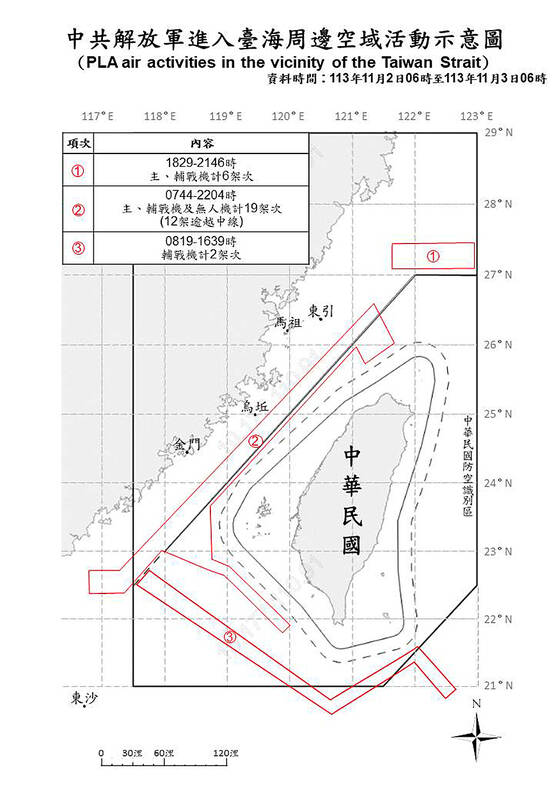The Ministry of National Defense (MND) yesterday said it spotted 35 Chinese military aircraft, including fighters and bombers, flying to the south of Taiwan proper on the way to exercises in the Pacific, a second consecutive day it has reported such activities.
The Chinese Ministry of National Defense did not respond to a request for comment on the missions, reported just days before tomorrow’s US presidential election.
The US is bound by law to provide Taiwan with the means to defend itself. Its arms sales to Taipei include a US$2 billion missile system announced last month.

Photo courtesy of the Ministry of National Defense
The MND said that from 9am yesterday, it had detected 37 Chinese military aircraft, including J-16 fighters, nuclear-capable H-6 bombers and drones.
Of those, 35 flew to Taiwan’s southwest, south and southeast into the western Pacific to carry out long-range training, the ministry said, adding that it had dispatched its own forces to keep watch.
On Saturday, the ministry said China had carried out another “joint combat readiness patrol” with warships and aircraft near Taiwan.
In related news, a source yesterday said that the first sets of M142 High Mobility Artillery Rocket Systems (HIMARS) purchased from the US in 2020 and 2022 arrived in Taiwan last month ahead of schedule.
The military purchased 29 sets of HIMARS in two procurements, with the first 11 sets originally scheduled to arrive between the end of this year and the beginning of next year, and the remainder in 2026.
The 58th Artillery Command of the 10th Army Corps stationed in central Taiwan is training with the platforms, the source said.
Taiwan had originally sought to purchase M109A6 howitzer artillery weapons from the US, but later worked out a deal to purchase HIMARS after the howitzers became unavailable.
Along with the HIMARS, the procurement included 84 MGM-140 Army Tactical Missile Systems (ATACMS), 864 precision rockets, two sets of training simulators and other ancillary equipment.
The HIMARS are to be operated by the army, while the air force’s Air Defense and Missile Command would continue to operate domestically produced Hsiung Feng (“Brave Wind,” 雄風) missile systems. The ATACMS would be deployed based on assessments by the General Staff Headquarters units.
During an interview Su Tzu-yun (蘇紫雲), a research fellow at the state-run Institute for National Defense and Security Research, said that Taiwan would use two types of munitions with the HIMARS: a traditional rocket with a range of 50km to 70km and ATACMS missiles with a range of 300km.
The military could possibly acquire Precision Strike Missiles with a range of nearly 500km, he said.
The sale of the 300km-range missiles to Taiwan signaled mutual trust between Taipei and Washington, which would facilitate future procurements, he said.

INVESTIGATION: The case is the latest instance of a DPP figure being implicated in an espionage network accused of allegedly leaking information to Chinese intelligence Democratic Progressive Party (DPP) member Ho Jen-chieh (何仁傑) was detained and held incommunicado yesterday on suspicion of spying for China during his tenure as assistant to then-minister of foreign affairs Joseph Wu (吳釗燮). The Taipei District Prosecutors’ Office said Ho was implicated during its investigation into alleged spying activities by former Presidential Office consultant Wu Shang-yu (吳尚雨). Prosecutors said there is reason to believe Ho breached the National Security Act (國家安全法) by leaking classified Ministry of Foreign Affairs information to Chinese intelligence. Following interrogation, prosecutors petitioned the Taipei District Court to detain Ho, citing concerns over potential collusion or tampering of evidence. The

Seventy percent of middle and elementary schools now conduct English classes entirely in English, the Ministry of Education said, as it encourages schools nationwide to adopt this practice Minister of Education (MOE) Cheng Ying-yao (鄭英耀) is scheduled to present a report on the government’s bilingual education policy to the Legislative Yuan’s Education and Culture Committee today. The report would outline strategies aimed at expanding access to education, reducing regional disparities and improving talent cultivation. Implementation of bilingual education policies has varied across local governments, occasionally drawing public criticism. For example, some schools have required teachers of non-English subjects to pass English proficiency

‘FORM OF PROTEST’: The German Institute Taipei said it was ‘shocked’ to see Nazi symbolism used in connection with political aims as it condemned the incident Sung Chien-liang (宋建樑), who led efforts to recall Democratic Progressive Party (DPP) Legislator Lee Kun-cheng (李坤城), was released on bail of NT$80,000 yesterday amid an outcry over a Nazi armband he wore to questioning the night before. Sung arrived at the New Taipei City District Prosecutors’ Office for questioning in a recall petition forgery case on Tuesday night wearing a red armband bearing a swastika, carrying a copy of Adolf Hitler’s Mein Kampf and giving a Nazi salute. Sung left the building at 1:15am without the armband and apparently covering the book with a coat. This is a serious international scandal and Chinese

TRADE: The premier pledged safeguards on ‘Made in Taiwan’ labeling, anti-dumping measures and stricter export controls to strengthen its position in trade talks Products labeled “made in Taiwan” must be genuinely made in Taiwan, Premier Cho Jung-tai (卓榮泰) said yesterday, vowing to enforce strict safeguards against “origin laundering” and initiate anti-dumping investigations to prevent China dumping its products in Taiwan. Cho made the remarks in a discussion session with representatives from industries in Kaohsiung. In response to the US government’s recent announcement of “reciprocal” tariffs on its trading partners, President William Lai (賴清德) and Cho last week began a series of consultations with industry leaders nationwide to gather feedback and address concerns. Taiwanese and US officials held a videoconference on Friday evening to discuss the